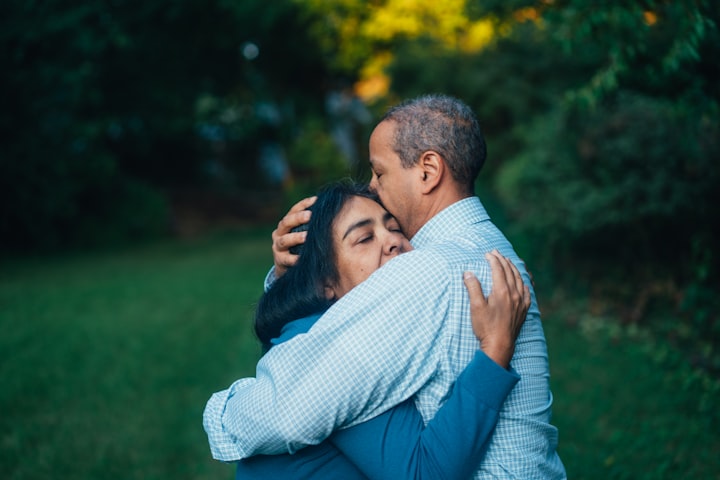The Power of Forgiveness
Letting Go and Embracing a Brighter Future

Forgiveness is one of the most powerful tools we have at our disposal. It can help us release the past, move on, and live a happier life. It's a process that requires courage, patience, and persistence, but it's one that is worth taking up.
In this post, we are going to explore the power of forgiveness and how it can help you overcome the challenges in your life. We'll look at different examples of people who have forgiven and how it has benefited them.
1. The Benefits of Forgiveness
Forgiveness is a powerful emotion that can have a lasting positive effect on your life. Here are some of the benefits of forgiveness:
1. It can help you to release the past and move on.
2. It can help you to feel more positive about yourself and your relationships.
3. It can help you to develop a stronger sense of self-esteem.
4. It can help you to feel more at peace with yourself and your surroundings.
5. It can help you to develop a more positive outlook on life.
If you're ready to start forgiving yourself and others, here are a few tips to help you get started.
1. Make a list of all the negative thoughts and feelings that you have about the person or situation that you want to forgive.
2. Write down all the facts about the situation, including what actually happened.
3. Try to remember the emotions that you felt at the time of the event.
4. Write out a letter of forgiveness to the person or situation.
5. Share the letter with the person or situation, if you want to.
6. Allow yourself to feel the emotions that you wrote about.
7. Repeat these steps as often as you need to in order to release the past and move on.
2. How to Release the Past: The Four Stages of Forgiveness
There are four stages of forgiveness and it's important that you understand and go through each one in order to move on and heal.
Denial: In this stage, you may not want to forgive or accept that what happened happened. You may be angry, hurt, and resentful. You may try to hold on to the pain and hurt in order to keep yourself from feeling even more pain. This is a difficult stage to go through because it's tempting to stay in the past and never let go.
Anger: When anger begins to simmer, you may begin to feel frustrated, powerless, and resentful. You may lash out at those who have hurt you in the past or you may start to blame others for your problems.
Grief: At this stage, you may feel sadness, regret, and emptiness. You may also feel helpless and lost. You may feel like you can't move on until you've dealt with all of the pain and sadness.
Acceptance: In this stage, you may be able to see the good in the past and you may be able to forgive those who have hurt you. You may also be able to move on and start fresh. This is a difficult stage to go through because it feels like you're giving up on the person or situation that hurt you. However, if you can make it through this stage, it will help you move on and heal.
3. The Power of Forgiveness: How It Affects Your Life
However, forgiveness doesn't mean that the person who wronged you is forgiven. It means that you have forgiven them. It's a decision you make and it can be hard to forgive, but it's worth it.
4. How to Forgive Yourself: The Four Steps to Self Forgiveness
If you're anything like me, you've probably been caught up in the cycle of guilt, regret, and self-judgement. It's hard to break out of the cycle and forgive yourself, but it's absolutely necessary if you want to move on from the past.
The first step is to recognise that you are not alone. Everyone experiences difficult moments and difficult relationships at some point in their lives. The key is to remember that you are not responsible for the pain and hurt that others have caused you.
The second step is to take some time for yourself. This doesn't mean you have to isolate yourself from the world, but it does mean that you should give yourself permission to be sad, lonely, and frustrated. This is your time to heal and process what's happened.
The third step is to forgive yourself for the things that you can't change. This doesn't mean that you condone or agree with the actions that led to the pain, but it does mean that you accept them. You can't change the past, but you can change the way you respond to it.
The fourth and final step is to forgive yourself for the things that you can change. This means that you forgive yourself for the pain and hurt that you caused, the damage that you caused, and the hurt that you will continue to cause in the future.
5. The Most Important Thing to know about Forgiveness
People go through a lot of pain and anguish in their lifetime. Some of it is unavoidable, and some of it is our own doing. No one is perfect and no one deserves to be treated poorly. That's why it's so important to learn how to forgive.
Forgiveness doesn't mean you condone the mistreatment you've been subjected to. In fact, you may find that you can't forgive the person who treated you poorly. What forgiving them means is that you're accepting that they have a right to their own feelings, and that you'll no longer hold them accountable for the pain they've caused you.
You may find that forgiving them doesn't mean that you're forgetting what they did, but it does mean that you're moving on.
6. The Power of Forgiveness: How It Can Change the Course of Your Life
Forgiveness is not a quick fix. It's not something that can be done overnight. It's a long, hard, and often difficult journey. But it's one that is well worth taking if you want to live a happy and healthy life.
7. The Key to a Meaningful Life: Forgiving Yourself
The act of forgiving yourself sets you free. It allows you to move on and start fresh. It's like taking a weight off your shoulders. It's a relief.
The first step is to sit down and really think about all of the times you have hurt yourself and others. Make a list. It can be long or it can be short, but it's important to get it all out there.
Once you have your list, it's time to start forgiving yourself. Start with the easiest people to forgive and work your way up.
Forgiving yourself doesn't mean you have to forget what happened. It means you're letting go. You're telling yourself that what happened wasn't your fault and that you didn't do anything wrong.
It may take time to forgive yourself, but it's worth it. You'll feel lighter and more free. You'll be able to move on and have a more meaningful life.
8. Why Forgiveness is Important: The 10 Benefits of Forgiving Others
Forgiveness allows you to set yourself free from the past and the pain it has caused you. It also allows you to move on and start fresh.
Think about it. When you forgive someone, you're not only releasing them from your anger or resentment but you're also forgiving them for their actions. And sometimes, we need to forgive people even if they don't deserve it.
10. You'll be less likely to hold grudges.
When we forgive, we're also freeing ourselves from the cycle of hurt, anger, and resentment. And that's why forgiving is so important.
9. The Power of Forgiveness: How It Can Help You Reconcile with Others
Forgiveness is one of the most powerful tools we have. It allows us to release the past and move on. It helps us to reconcile with others.
When we forgive someone, we are saying that we no longer hold bitterness and anger towards that person. We are giving them the opportunity to make things right.
Forgiveness is a process and not an event. The act of forgiving doesn't mean that we condone the person's actions or that we agree with them. On the contrary, we still hold them accountable for their actions. We just want them to be forgiven.
Forgiveness isn't easy. It takes time, patience, and strength. But it is worth it.
10. Conclusion: The Power of Forgiveness
I hope you enjoyed this article on the power of forgiveness. Forgiveness is a powerful emotion that can help us move on from our past and live a happier life. Many of us hold on to our anger and resentment towards others, even though it does not serve us in any way. Forgiveness allows us to let go of our past and focus on the present. It is through forgiveness that we can truly begin to heal. Thank you for reading, and I hope that you found my article helpful.
About the Creator
Radhakrishnan
I am a passionate and dedicated writer. I specialize in creating compelling content that is both engaging and informative.My writing skills include crafting blog posts, articles, website content, product reviews, and more.






Comments
There are no comments for this story
Be the first to respond and start the conversation.